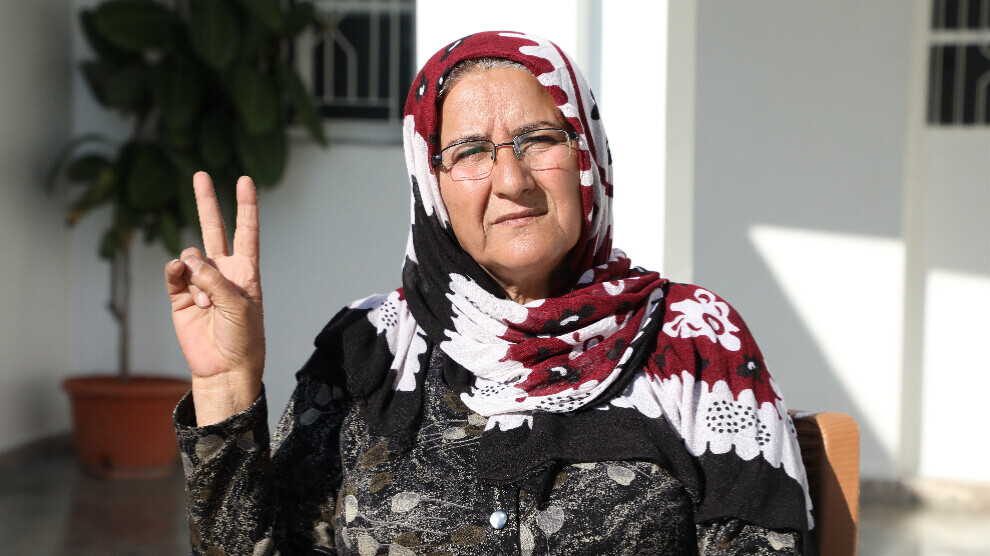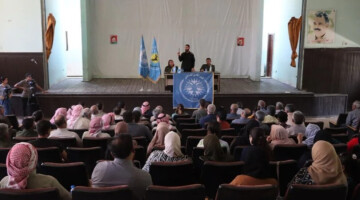The arrival of Abdullah Öcalan in Rojava in 1979 ignited new hope for the Kurdish people. This moment inspired many people to fight for the freedom of their people.
One of those people is 56-year-old Hêvî Îbrahîm Hesen. Born and raised in Qamishlo, she met the Kurdish Freedom Movement in 1990 and actively participated in the endeavor of raising awareness among the people. She went door to door, spreading the ideas of Abdullah Öcalan. Reflecting on those days, Hêvî Îbrahîm Hesen said: "We were prepared to be arrested, but we never took a step back. Despite the oppression and brutality of the Syrian regime, we insisted on maintaining our presence. Because we believed that Abdullah Öcalan’s ideas would lead our people to the light."
A promise to her brother, a martyr of the Kurdish freedom struggle
During the condolence for her uncle, Xurşîd Sileyman (Şahin), who fell a martyr in 1990, her brother, Reşît Îbrahîm Hesen, made a vow to join the Kurdish Freedom Struggle. This commitment further strengthened the family's deep-rooted dedication and determination to the movement. However, when Reşît fell martyr in 1996, it left a profound impact on Hêvî, reinforcing her resilience and strengthening her determination to fight for freedom. Recalling her farewell to her brother, she said: "Do not worry, our doors will always remain open to our comrades. We will walk in the path of the struggle you devoted your life to."
Struggle against the oppression of the Ba’ath regime
As someone deeply connected to her Kurdish identity, language, and culture, Hêvî Îbrahîm Hesen faced numerous historical hardships and oppression. Together with her family, they suffered greatly under the tyranny of the Baath regime, which implemented policies aimed at denying and erasing the Kurdish identity while also economically suffocating the Kurdish people. Due to these economic hardships, she was forced to migrate to Damascus, where she lived for nine years.
Despite living in Damascus, Hêvî Îbrahîm Hesen never abandoned her patriotic duties and responsibilities. During this period, she actively participated in various activities, contributing to the struggle for Kurdish rights. She always prioritized national consciousness, both for herself and her family, and despite the challenges she faced, she never lost her faith. Her unwavering stance during this time became an example for the Kurdish people living in Damascus.
She returned to Qamishlo when the Rojava Revolution began
Speaking about the Rojava Revolution with shining eyes, Hêvî Îbrahîm Hesen said: "When I heard that the revolution had begun, the first thing I did was start preparing to return to Qamishlo. The Baath regime had forcibly conscripted my son, and he had served in the military for four years. I had to find a way to free him from this oppression and return to Qamishlo. The dreams we had nurtured for years were finally coming true, and in 2011, I was going back to the city where I was born and raised."
The beginning of the Rojava Revolution marked yet another turning point in Hêvî’s life. This movement presented the Kurdish people with a historic opportunity for self-governance and the pursuit of freedom. Determined to rescue her son from the forced military service he endured under the Syrian regime for four years, she set her sights on returning to Qamishlo, her birthplace. With her voice filled with emotion, she described that moment: "When I heard that the revolution had begun, the first thing I did was start preparing to return to Qamishlo. The Baath regime had taken my son by force. He had been serving in the military for four years. I had to free him from this oppression and return to my homeland. The dreams we had nurtured for years had come true, and in 2011, I was going to the city where I was born and raised, Qamishlo."
With the Rojava Revolution, numerous institutions and organizations were established across Northern and Eastern Syria. During this period, Hêvî Îbrahîm Hesen remained committed to revolutionary ideals, playing an active role in the formation and development of these institutions. With an unwavering desire to contribute to the freedom struggle of her people, she made a conscious effort to be involved in every stage of the revolutionary process. She led efforts to protect their identity and hard-won achievements in the streets, villages, and cities. This struggle became one of the fundamental pillars of the Rojava Revolution’s success. Hêvî Îbrahîm Hesen played a crucial role in strengthening the principles of social solidarity and self-defense, which formed the foundation of the Rojava Revolution. For the past three years, she has continued to serve the revolution as a member of the Social Self-Defense Forces (HPC), ensuring that the resistance endures and thrives.
Victory will be ours in Tishrin
Having lost 16 family members as martyrs, Hêvî Îbrahîm Hesen is one of the courageous mothers who joined the Tishrin Dam resistance on January 17. Taking action to protect her land, water, and energy resources, she declares: "Today is not a day to sit at home. Our people do not fear death. They are willing to sacrifice their lives, but they will never accept the occupation of Tishrin. A Revolutionary People's War is being waged in the lands of North and East Syria. Those who resist are the people themselves." She emphasizes the significance of the resistance and firmly believes in achieving victory together.
Highlighting the unity of the peoples, Hêvî Îbrahîm Hesen states: "We are going to defend our dam together with Kurds, Armenians, Syriacs, Arabs, and all other peoples. Tishrin Dam belongs to us. We are ready to sacrifice ourselves, but we will never allow the occupation of Tishrin. Tishrin is our honor, and we will defend it with our lives."














